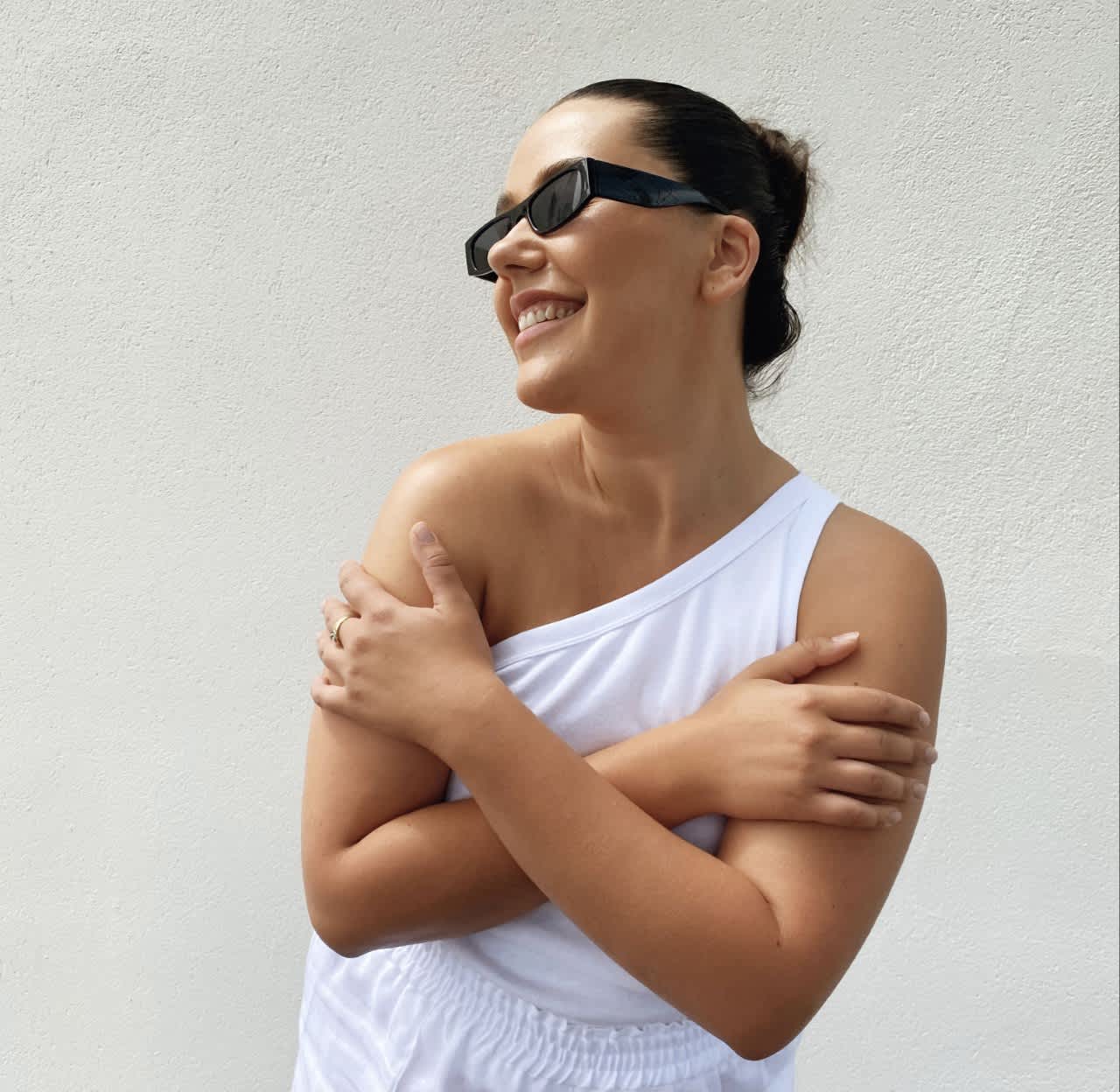
- POPSUGAR Australia
- Living
- “A Shift is Happening”: Chanel Contos’ Push For Schools to Teach Consent Takes a New Step
“A Shift is Happening”: Chanel Contos’ Push For Schools to Teach Consent Takes a New Step

**Trigger warning: this article deals with the topic of sexual assault and rape and may be triggering for some readers.
It’s been six months since Australian student Chanel Contos posted that series of Instagram Polls, asking her followers about school-based experiences of sexual assault.
And today, at 23 years old, she’s heading up campaign movements to abolish rape culture in Australia and make consent a mandatory part of the school curriculum.
Having just finished her Masters in Gender, Education and International Development, Chanel did not expect to be in the position she is now, but she’s running with it.
“I didn’t expect this to happen. Not at all. Like, at all.” she tells POPSUGAR Australia.
“I would’ve literally been really happy if my old school and the neighbouring boys’ school did something about it.”
Those Instagram polls led Chanel to create a petition — which now has 44,722 signatures — for consent to be included in Australian schools’ Sex Education earlier (you can sign it here).
These days, she spends her time campaigning, talking to politicians, decision-makers and people who run women’s organisations around the country about why consent is a concept that needs to be taught in schools, particularly before students become sexually active.
The final revision to the Australian Curriculum (which happens every five years), is set to be provided to educations ministers before the end of 2021.
Right now, the new proposed curriculum review has been updated to include consent at every age level, but only in the elaboration.
“It’s not mandatory, which means that schools can choose whether they teach it or not,” explains Chanel. “For example, more religious schools may choose to ignore concepts of consent.”
“When we talk about consent, like every time we talk about it, we also need to talk about the power imbalances and gendered expectations to create this holistic understanding.
“And the problem is, those lessons aren’t mandates or in the elaborations either.”
There is so much more to consent than just sex. When I think about all the things I have learnt about consent in my adult life as a woman, it has been about learning to use my voice to speak up in situations that make me uncomfortable and to listen to my body and instincts.
It seems wild to me that consent isn’t a mandatory concept in the curriculum to students of all ages, from prep, right up to graduation in year 12.
Sure, the majority of school-related sexual abuse happens in high school, but where does that behaviour come from? If we have no concept of the importance of consent or even how to practise it in simple ways, then what hope do we have?
“Consent is not a yes or no. Consent is about body language, it is about enthusiasm,” Chanel explains.
“It’s quite obvious when you’re kissing someone if they want to be kissing you or not. They either have their hands on you, and they’re, you know, opening up to you, or they’re more hesitant and reserved, or even just trying to, like, get away.
“It’s pretty f*cking simple. It’s empathetic. Consent is empathetic, which I think people don’t understand. It’s not black and white, it’s dynamic. It’s ever-changing, and it should be taught that way.
“It also should be taught in the context of the current society whereby there is a power imbalance between ages, there is a power balance between the sexes and there is a power imbalance between whose sexuality we value.”
It’s really tricky coming to terms with consent when you’ve not been taught it. Women in my and Chanel’s generation were taught some basic anatomy of our bodies and how to put a condom on in high school sex ed… and that’s basically it.
No one prepares you for the emotional and sometimes traumatic experiences that you endure when everyone is just trying to figure sh*t out, without any concept of consent or female empowerment.
To begin to value yourself a women, to value your worth and start to realise that you have a much deeper purpose than being desired by men, you find yourself reflecting on sexual experiences you’ve had in the past and they look different to how you may have seen them at the time.
“I do see a shift happening,” Chanel says.
“It’s going to be hard to move through the initial stages of learning, but then it will become normal and that’s pretty amazing.
“As soon as it’s more normal for a teenage boy to call out their friend for perpetuating rape culture, to be like ‘Boyd, don’t honk at her’, they’ll find other ways to get girls’ attention and everything with happen so quickly.
“But we just need to reach that point. We need to empower people to speak out about injustices, we need to engage boys and men in the conversation and we need to lead by example and ask the government for the policies we need.”
We also need to start talking about consent to those closest to us. We need to be open about our own experiences and come to terms with the damage that has been caused by our generation and generations before us, not being taught those integral lessons about consent from a young age.
One of the most motivating parts of Chanel’s experience throughout this journey she’s on has been the messages she’s received from victims, sharing their stories.
“One girl was like: ‘I spoke to my family about this for the first time with someone last night’.
“She told me that she told her dad that she was sexually assaulted by her best friend on holiday and you know, he was crying.
“Unfortunately, it needs that sort of like connection. People need to have that moment of, “wow, this is real, this happens to people every day.”
“And I feel like that is happening more, which is really exciting.”
This week, Contos has taken further steps to evolve the national conversation around consent education with the launch of a new campaign rolling out across capital cities in New South Wales, Victoria, and Queensland just in time for International Consent Day on November 30th.
The campaign continues to build awareness around the necessity for mandatory consent education across the country, lobbying the Australian government ahead of a scheduled five-year review of the national school curriculum in December.
And thankfully, there’s no mention of ‘milkshakes’, ‘tacos’ or any other metaphors that have only added confusion to a topic that needs an open dialogue and transparency.
“This is our final push to mandate consent education in every school in Australia,” Chanel says.
“We hope this campaign keeps conversations going about rape culture and the role education has in demolishing it. The international day of consent is the 30th of November. At this time, let’s not forget how transformative education can be in creating a respectful, healthy, and harm free Australia.”
At our level of social transparency and awareness right now, it feels like a no-brainer for consent to be an integral part of the curriculum for Australian students of all ages.
“We can’t teach about sex properly talking about ‘the birds and bees’, we can’t teach consent talking about milkshakes and tacos. Say it how it is and use the opportunity to reduce gender-based violence in our society.”
“It’s not just catcalling, it’s sexual harassment. Most of our population doesn’t know that because they were never taught that. Our generation is changing this.”
The campaign, which will be delivered through outdoor posters and across social media (Facebook and Instagram), aims to provide some much needed context on the topic of consent, helping arm young Australians with a clearer understanding of how it affects them in their everyday lives.
I am personally so grateful for young women like Chanel Contos, who utilise the rare power of social media to fuel social movements like this one. Movements that actually make a difference in young people’s lives.
Our experience with sex is super important and for many of us, our innocence is taken away in brutal ways that quite frankly, could be avoided. We’re starting to see open discourse about sex and sex education crop up and I’ve felt this universal sigh of relief. Finally, we’re talking about the things that make us uncomfortable, but have caused us so much pain and trauma and oppression.
To think that consent is close to being a mandatory part of Australian education makes me feel hopeful for future generations and helps me to believe in a society that is constantly bettering itself.
For that, I thank women like Chanel Contos, a true representation of a feminist hero.
You can sign the petition here and find other campaign resources here.



